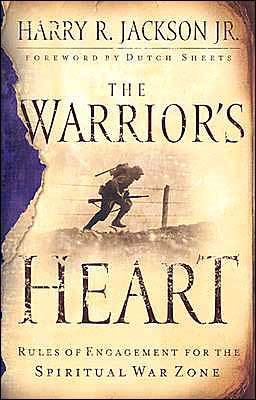Harry Jackson: The Warrior’s Heart
 Harry R. Jackson, Jr., The Warrior’s Heart (Grand Rapids: Chosen Books, 2004), 224 pages.
Harry R. Jackson, Jr., The Warrior’s Heart (Grand Rapids: Chosen Books, 2004), 224 pages.
Despite its militaristic title, and soldiering themes, The Warrior’s Heart is a very spiritual work. Bishop Harry Jackson’s work is rather thoughtful, yet focused on the realities of living a purposeful Christian life in today’s world. This work is obviously the result of much prayer, Christian experience and careful consideration of today’s Christian walk.
The writing in The Warrior’s Heart is accessible and direct. Jackson quotes a wide variety of writers and personalities in his work, making good use of anecdotes and stories to deliver his message. This writing style allows The Warrior’s Heart to serve a great variety of potential readers. Pastors and church leaders can read the book and gain valuable insights. Laymen will find the book a valuable and easily understood learning tool.
The twelve chapters of The Warrior’s Heart are divided into three major parts: The Warrior’s Inner Life, The Warrior’s Relationships and The Warrior’s Corporate Connections. Each part addresses a different aspect of Christian soldiering, starting from the inside and working out.
Inner Life: Just as a natural army would, the church must teach and strengthen the individual soldier. Chapter 2, Honor Code and Conscience: Hearing the Voice of God provides strong teaching on the role and purpose of conscience in a believer’s life. Not content with the common interpretation of conscience, Jackson demonstrates how our inner voice must become a direct line to God’s Will and Purpose.
Team Life: After building up the individual warrior, an army turns its attention to the relationships among the troops. Chapter 7, “Friendly Fire: The Difficult “Significant Others’” teaches us how to uphold and strengthen each other. Using the dubious help of Job’s friends and comforters as a backdrop, Jackson points how we must help each other live the Christian life.
Far from condemning, this chapter points out how all armies hurt or kill their own during the chaos of the battlefield. Jackson’s point is to show Christians how to avoid giving or getting “friendly fire.” Despite the turmoil and rush of our modern lives, we can become a blessing to our fellow believers, no matter the circumstances.
Corporate Life: Strong individual soldiers, and superior small units, do not automatically create an excellent army. If the leadership and structure of the controlling organization are poor, the war will be lost. Chapter 10: “Corporate Destiny: Esprit de Corps,” emphasizes this point.
Jackson explains how individual local Churches have unique callings, much like individual Christians. He shows how the corporate church and the individual believers must interact to advance God’s Kingdom in harmony and order. The only agenda that should be advanced is the one that comes from God.
Category: Living the Faith, Summer 2005


